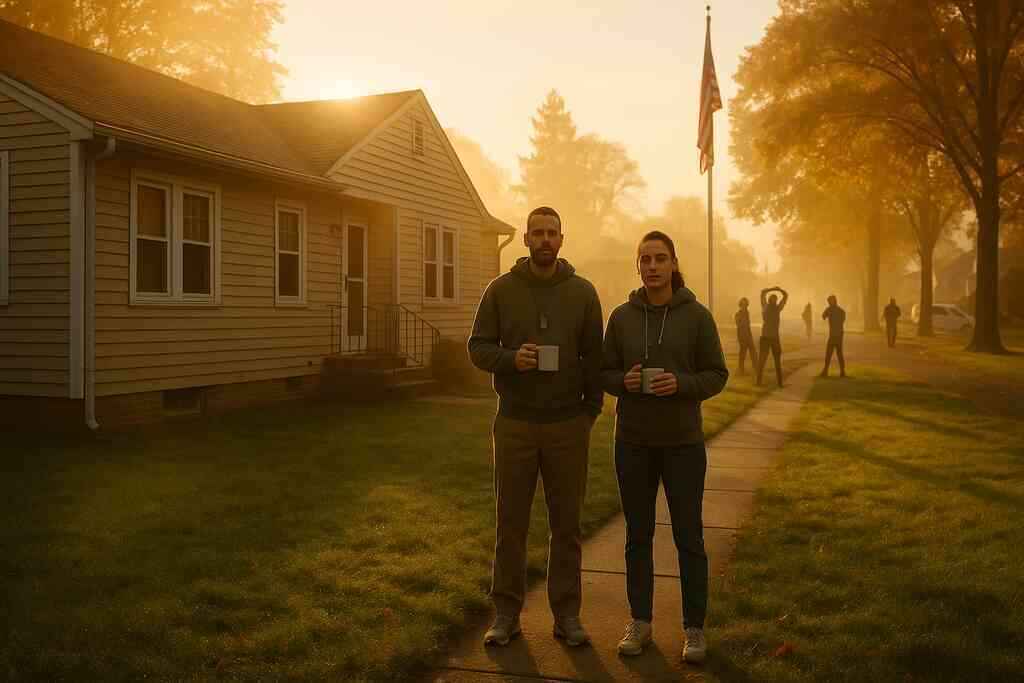
Guide to Navigating Sober House Choices in Illinois
August 30, 2025
Embarking on the Path to Sobriety in Illinois
Understanding the Landscape of Sober Living in Illinois
When it comes to achieving long-term sobriety, understanding sober living options in Illinois plays a crucial role in your recovery journey. Illinois provides a myriad of opportunities and structures designed for those in early recovery phases. From halfway houses to top sober homes, Illinois offers an environment conducive to sobriety. These sober living environments support residents in reconstructing their lives free from alcohol and drugs, fostering a safe and supportive community rich with resources and peer connection. Navigating these choices, however, requires a deep understanding of the local dynamics shaping these sister communities.
Illinois stands out by integrating traditional 12-step programs with innovative therapies tailored to individual needs. Transitioning from rehab centers into a sober living environment involves embracing a structure that supports early recovery and long-term success. As recovery unfolds, supportive sober homes in Illinois ensure continuity of care, helping individuals weave themselves back into the fabric of society with a renewed purpose.
Essential Criteria for Selecting a Trusted Sober House
Choosing a sober house in Illinois requires careful consideration of various factors that can influence your recovery path. Assessing the sober house dynamics in Illinois is foundational to identifying a residence that aligns with personal goals and needs. One must evaluate the house rules, ensuring they foster a respectful and nurturing environment conducive to healing.
Conducting thorough research on house managers’ roles and the sense of community in each sober house can significantly impact your recovery experience. The ideal sober living house maintains a democratic atmosphere where residents contribute to decisions, furthering accountability and a sense of belonging. It is also essential to assess the daily routines and activities promoted within these houses, as they should align with your recovery objectives and personal interests.
Peer support plays a significant role in long-term recovery, making it important to analyze the level of camaraderie and shared experiences within a sober house. Selecting a house with robust peer support networks can offer greater emotional stability and a shared sense of purpose, which can be instrumental in maintaining sobriety.
Illinois Communities: A Network of Support and Recovery
The fabric of Illinois communities for sober living is dense with resources and networks aimed at supporting individuals on the path to sobriety. These communities provide more than just a residence- they offer a lifeline to individuals seeking a transformative recovery experience. By fostering connections and promoting inclusivity, Illinois’ sober living environments become crucibles for change.
Illinois prides itself on curating comprehensive programs that tightly weave community support into its sober living strategies. From local support groups to statewide initiatives, these programs address the diverse needs of those overcoming alcohol addiction and substance use disorders. Peer support systems within these communities empower residents by creating pathways to sustainable recovery and fostering shared accountability.
Integral to the success of these communities is the emphasis on developing safe, inclusive environments. Sober living houses become microcosms of hope, nurturing personal growth and resilience as residents find their footing on their recovery journey. As these communities synergize with rehab centers, outpatient programs, and 12-step meetings, they pave the way for continual recovery and renewal across the state.
Decoding the Dynamics of Sober Houses
House Rules: Foundations of a Sober Living Environment
In Illinois, house rules serve as the building blocks for establishing a stable sober living environment. These rules are crucial in maintaining a respectful and drug-free atmosphere. The role of house rules in sober living ensures that each resident adheres to established guidelines that protect the community’s integrity. Residents are expected to participate in routine activities, attend meetings, and respect curfews-all vital aspects that foster personal responsibility and discipline. This structured approach not only aids in minimizing relapse risks but also instills a sense of unity and mutual respect among residents, essential for a supportive community.
Peer Support and Group Homes: Building Resilience
Group homes in Illinois act as nurturing grounds where peer support is pivotal in cultivating resilience. Here, residents engage with one another, sharing experiences and offering emotional support, thereby reinforcing their commitment to sobriety. Effective peer support in sober houses in Illinois acts as an anchor against the tides of relapse, promoting communal healing and growth. Such supportive networks are invaluable as they encourage the sharing of sobriety strategies, fostering a deep sense of belonging. In these communal settings, recovery becomes a shared journey, with each member contributing to each other’s success, establishing a robust foundation for long-term sobriety.
Role of House Managers and Daily Routines in Recovery
House managers play a decisive role in the seamless operation of sober homes. They guide residents through their recovery journey by instilling structured daily routines that are aligned with recovery goals. Their responsibilities often include facilitating conflict resolution, organizing group activities, and ensuring compliance with house rules. This leadership helps create a predictable environment where each sober housing resident feels secure and focused on their recovery. Regularly scheduled community meetings and activities encouraged by house managers contribute to a balanced lifestyle, promoting mental and physical well-being. The integration of such consistent daily routines is instrumental in transitioning individuals from the chaos of addiction to a life of sobriety and purpose.

Transformative Recovery Journeys: Opportunities and Resources
Pathways to Long-Term Sobriety: Illustrious Illinois Programs
Embarking on a journey toward long-term sobriety requires understanding the comprehensive pathways to sobriety programs in Illinois. These programs integrate innovative therapies and traditional approaches, creating a customized plan to support individuals from various backgrounds and addiction challenges. By fostering unique elements like art therapy, cognitive behavioral therapy, and mindfulness practices, these programs address the emotional and psychological facets of recovery. This holistic approach enables individuals to build a robust foundation for lasting sobriety. Moreover, the interconnected network within these programs helps instill responsibility and mutual support, promoting personal growth and sustainable well-being.
Illinois continuously aims to evolve its rehabilitation strategies by incorporating evidence-based practices that align with individual needs. These illustrious programs emphasize community engagement and empowering residents to take charge of their recovery journey. By blending personalized care with communal support, Illinois boasts an environment where individuals can embark on transformative journeys, reaping the benefits of successful recovery pathways designed specifically for them.
Integrating Inpatient and Outpatient Treatment Options
The integration of inpatient and outpatient treatment options plays a critical role in Illinois’ addiction recovery narrative. Inpatient treatment offers a structured, immersive environment ideal for individuals needing constant supervision and intensive therapy. Conversely, outpatient options provide flexibility, ideal for those who wish to maintain some degree of normalcy in their daily lives. These outpatient programs often include group counseling, individual therapy sessions, and educational workshops to supplement ongoing recovery efforts. By offering a continuum of care tailored to unique needs, Illinois ensures robust support at every recovery stage.
Illinois’ seamless integration of detox and rehab services fortifies an individual’s path to recovery, allowing them to transition smoothly from detoxification into structured therapeutic programs. This comprehensive approach mitigates the risk of relapse, ensuring individuals receive continuous support and guidance. By adopting these adaptable treatment models, residents can experience a balanced, effective recovery journey, equipped with the skills necessary for long-term success.
Leveraging Support Groups and 12-Step Meetings
Effective recovery strategies in Illinois heavily depend on support groups and 12-step meetings that promote accountability, empathy, and shared experiences among participants. These gatherings provide a safe, encouraging space for individuals seeking sustained recovery. Facilitating emotional bonds and fostering community connections, these meetings work to eliminate the isolation often associated with addiction. With groups such as Alcoholics Anonymous and Narcotics Anonymous, individuals find solace in shared stories and collective strength, essential for enduring sobriety.
Participation in support groups enhances personal insight and delivers opportunities to learn from others who have traversed similar journeys. By consistently attending these meetings, individuals bolster their resilience and reinforce their determination to remain sober. Encouraged through these shared endeavors, community members collaborate to develop effective coping strategies, nurturing an environment where collective healing and growth become reality. In Illinois, recovery is not just an individual pursuit-it’s a supportive community initiative, bringing together diverse paths toward a common goal: long-term sobriety.
Cultivating a Safe and Supportive Illinois Sober Community
Developing the Ideal Sober Living Environment
Creating the ideal sober living environment in Illinois plays a pivotal role in the recovery journey. Central to this is a focus on maintaining a safe sober environment impact that fosters healing and transformation. These environments are meticulously curated to eliminate triggers associated with substance use, offering residents a refuge where they can focus on recovery. The homes often feature structured routines, which contribute to stability and a sense of purpose. Additionally, these environments are integrated with community resources that provide both mental health support and peer interaction. This holistic approach ensures that residents are not only safe but are also empowered to address underlying issues contributing to addiction.
Managed by dedicated professionals, these homes uphold a supportive ethos where each resident’s needs are met with compassion and understanding. By prioritizing safety and support, these communities enhance the potential for long-term sobriety, making them foundational to effective recovery pathways in Illinois.
Breaking Free: From Alcohol Abuse to Recovery Success
Achieving recovery success in Illinois involves breaking free from the chains of alcohol abuse through alcohol addiction recovery strategies. Emphasizing individualized care, Illinois sober homes and recovery programs collaborate with residents to create customized plans that address unique challenges. These strategies typically incorporate a blend of therapeutic modalities, including cognitive behavioral therapy and mindfulness practices, that help rebuild individuals’ lives. By addressing the psychological and emotional facets of addiction, residents are better equipped to prevent relapse and sustain recovery.
The transition from alcohol abuse to sobriety is often bolstered by community support and peer involvement. Residents of sober homes engage in shared activities and meetings, fostering a sense of belonging and collective resilience. These interactions lay the groundwork for recovery success, providing necessary reinforcement as individuals navigate the complexities of leaving alcohol abuse behind. With the right support system in place, Illinois residents find themselves on a transformative path towards sustained sobriety.
Navigating the Intersection of Rehab Centers and Sober Homes
Understanding the integration of detox and rehab and sober homes is crucial to achieving successful recovery outcomes in Illinois. Rehab centers offer crucial initial detox services that help individuals safely withdraw from substances under medical supervision. Post-detox, the transition to a sober living environment provides a continuum of care where individuals can apply the skills learned in rehab. Sober homes act as the bridge, ensuring residents continue to have access to therapeutic support and structured living even as they reintegrate into daily life.
Rehab centers and sober homes in Illinois work synergistically, aligning treatment plans to provide personalized care tailored to individual recovery journeys. This intersection allows for a seamless transition that minimizes the risk of relapse, maintains momentum in recovery, and reinforces healthy lifestyle habits. As residents move through these stages, they benefit from comprehensive accountability and peer support. This integrated treatment approach not only nurtures sustained recovery but also empowers individuals to reclaim control over their lives, paving the way for renewed purpose and fulfillment.

Conclusion: Embracing a New Life in Illinois’ Sober Residences
A Future of Recovery and Renewal
Navigating the intricate journey of recovery in Illinois’ sober residences paves the way for a future of renewal and hope. Residents, embraced by communities that emphasize safety and support, find themselves reborn into a life devoid of alcohol and drugs. By leveraging resources like Illinois addiction recovery programs, individuals unearth pathways tailored to their unique journeys. Each step toward healing is reinforced by an environment designed to foster self-discovery and resilience. As individuals transition from the shadows of addiction, they weave intricate tapestries of renewed purpose and unwavering vitality, illustrating the profound impact of Illinois’ top sober homes.
With an abundance of resources and unyielding community support, the pursuit of long-term sobriety becomes an achievable goal, empowering residents to reclaim their lives. Illinois’ sober homes function as sanctuaries, providing the tools needed for individuals to overcome challenges and forge futures filled with possibilities. Guided by the warmth of communal empathy, these residences nurture enduring recovery and facilitate transformative growth. As individuals embrace new beginnings, they lay the groundwork for a future defined by resilience, wellness, and the indomitable spirit of renewal.
Continual Support in Illinois’ Sober Living Ecosystem
The network of continual support within Illinois’ sober living ecosystem ensures that residents are never alone on their recovery journey. It acts as a sturdy bridge between initial treatment and lifelong sobriety. Through comprehensive sobriety management resources, residents gain access to personalized care that extends beyond the walls of sober homes. These resources promote long-term wellness and aid individuals in integrating learned skills into their daily lives.
Illinois’ cities and communities collaborate to deliver lasting support through vibrant networks of Narcotics Anonymous meetings and other support groups. Participants find strength in shared stories and collective recovery goals, fostering bonds that withstand the test of time. Each meeting represents a haven where individuals can openly express their struggles and triumphs, reinforcing a communal commitment to sobriety.
Together, Illinois’ sober homes and recovery ecosystems transcend beyond mere recovery spaces; they embody an enduring community dedicated to ongoing growth and renewal. By integrating pioneering treatment approaches and fostering a sense of unity, these environments empower residents to navigate the complexities of their sobriety journeys with confidence and compassion. This unwavering commitment to mutual achievement and holistic support ensures that the path to recovery is never walked alone, offering a beacon of hope for all who seek lasting change in Illinois.
Frequently Asked Questions
Question: How does Top Sober House assist in choosing a sober house in Illinois for alcohol addiction recovery?
Answer: Top Sober House provides crucial support and guidance in selecting the best sober living environment tailored to individual needs. Utilizing our comprehensive directory, you can explore the trusted sober homes Illinois offers-enabling a secure and nurturing transition from addiction to sobriety. Our platform highlights key elements such as house rules, peer support dynamics, and community resources that are essential for alcohol addiction recovery in Illinois aims to foster. With our extensive resources, you can confidently navigate through the best Illinois sober living options and choose a facility conducive to your journey of long-term sobriety.
Question: What criteria does the Guide to Navigating Sober House Choices in Illinois suggest for selecting supportive sober homes?
Answer: The Guide to Navigating Sober House Choices in Illinois emphasizes evaluating house rules, house managers, peer support networks, and community resources within sober living environments. Top Sober House aligns with these criteria by offering detailed insights into the supportive sober homes Illinois provides. Our platform ensures you can assess the management style, communal activities, and the overall sober environment impact in Illinois sober houses. This thorough vetting process is crucial in identifying a safe, structured environment ideal for fostering personal responsibility, growth, and a supportive community.
Question: What role do peer support networks in Illinois sober houses play in fostering long-term recovery?
Answer: Peer support networks within Illinois sober living environments play an instrumental role in nurturing long-term recovery. These networks are crucial for fostering camaraderie, shared experiences, and communal growth that strengthen resilience among residents. At Top Sober House, we identify sober housing options in Illinois where peer support is prioritized to aid residents in sharing strategies, reflecting on recovery journeys, and building a supportive sobriety environment. This collective engagement is paramount in minimizing relapse risks and promoting emotional stability and shared commitment to sobriety.
Question: How does Top Sober House help individuals transition from rehab centers to sober homes in Illinois?
Answer: Top Sober House is dedicated to facilitating seamless transitions from rehab centers to sober homes across Illinois. Our directory includes comprehensive information on sober residences in Illinois that offer structured support and therapeutic continuity crucial for post-rehab recovery stages. By integrating paths such as inpatient and outpatient treatment options, we ensure individuals have access to continual guidance to foster their Illinois sober journey. This strategic support system empowers residents to apply learned skills in real-world settings within community-focused sober homes, ultimately reinforcing their path to long-term sobriety.
Question: How are house rules and daily routines evaluated by Top Sober House in selecting the ideal Illinois sober living guide?
Answer: When selecting the best Illinois sober living environments, Top Sober House evaluates house rules and daily routines crucially. Our careful assessment of Illinois sober living guide options ensures residents experience a structured, respectful, and drug-free environment where personal responsibility is enforced. We analyze how daily routines-comprising mandatory meetings, curfews, and community engagement activities-support personal development and discipline. By offering insights into how these dynamics cultivate a safe sober environment, Illinois needs residents to trust they’re entering an environment conducive to sustainable recovery.


